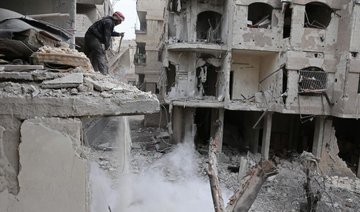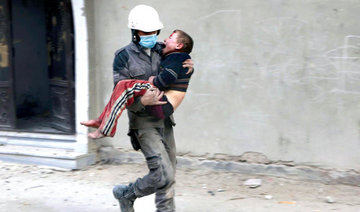BEIRUT: A new wave of bombs struck Syria’s Eastern Ghouta district unabated on Friday amid diplomatic scrambling to end one of the deadliest bombing campaigns of the seven-year civil war.
For a sixth straight day, warplanes flown by regime forces and their allies have pounded the densely populated enclave east of Damascus, the last opposition bastion near the capital.
The civilian casualties and devastation there are among the worst in Syria since the regime captured opposition-held parts of Aleppo in intense fighting in 2016.
At least 462 people have been killed and many hundreds injured, the Syrian Observatory for Human Rights monitoring group says. The dead include at least 99 children. Syrian state media reported one person was killed and 58 injured from opposition shelling of sites in Damascus, including a hospital.
Syria’s regime, with its allies Russia, Iran and Shiite militias, has often used the tactic of pushing opposition fighters to surrender their strongholds after long sieges and military offensives.
Insurgents in Eastern Ghouta have vowed not to accept such a fate, ruling out an evacuation of fighters, their families and other civilians of the kind that ended rebellion in Aleppo and Homs after heavy bombardment in earlier years.
“We refuse categorically any initiative that includes getting the residents out of their homes and moving them elsewhere,” Ghouta opposition factions wrote in a letter to the Security Council on Friday.
Eastern Ghouta has 400,000 people spread over a larger area than other enclaves the regime has recaptured. Late on Thursday, government aircraft dropped leaflets urging civilians to depart and hand themselves over to the regime army, marking corridors through which they could leave safely.
Medical charities say jets have hit more than a dozen hospitals, making it nearly impossible to treat the wounded.
The observatory said regime warplanes and artillery hit Douma, Zamalka and other towns across the enclave in the early hours on Friday.
A witness in Douma who asked not to be identified said by telephone that the early morning bombing was the most intense so far. Another resident, in the town of Hamouriyeh, said the assault had continued “like the other days”.
“Whenever the bombing stops for some moments, the civil defense vehicles go out to the targeted places. They work to remove the debris from the road,” Bilal Abu Salah said.
The Civil Defense there said its rescuers rushed to help the wounded after strikes on Hamouriyeh and Saqba. The emergency service, which operates in opposition territory, says it has pulled hundreds of people from under rubble in recent days.
Damascus and Moscow say they only target militants. They have said their main aim is to stop opposition shelling of the capital, and have accused insurgents in Ghouta of holding residents as human shields.
Hamza Birqdar, the military spokesman for the Jaish Al-Islam faction, said it had thwarted nine attacks by pro-regime militias trying to storm a front in the south-east of Ghouta.
The Security Council was expected late Friday to vote to demand a 30-day cease-fire in Syria.
The resolution being considered does not cover Daesh, Al-Qaeda and Al-Nusra Front, which Moscow and Damascus say they have targeted in Eastern Ghouta.
Deaths mount in Eastern Ghouta as world fumbles for response
Deaths mount in Eastern Ghouta as world fumbles for response

Syria authorities say torched 1 million captagon pills

DAMASCUS: Syria’s new authorities torched a large stockpile of drugs on Wednesday, two security officials told AFP, including one million pills of captagon, whose industrial-scale production flourished under ousted president Bashar Assad.
Captagon is a banned amphetamine-like stimulant that became Syria’s largest export during the country’s more than 13-year civil war, effectively turning it into a narco state under Assad.
“We found a large quantity of captagon, around one million pills,” said a balaclava-wearing member of the security forces, who asked to be identified only by his first name, Osama, and whose khaki uniform bore a “public security” patch.
An AFP journalist saw forces pour fuel over and set fire to a cache of cannabis, the painkiller tramadol, and around 50 bags of pink and yellow captagon pills in a security compound formerly belonging to Assad’s forces in the capital’s Kafr Sousa district.
Captagon has flooded the black market across the region in recent years, with oil-rich Saudi Arabia a major destination.
“The security forces of the new government discovered a drug warehouse as they were inspecting the security quarter,” said another member of the security forces, who identified himself as Hamza.
Authorities destroyed the stocks of alcohol, cannabis, captagon and hashish in order to “protect Syrian society” and “cut off smuggling routes used by Assad family businesses,” he added.
Syria’s new Islamist rulers have yet to spell out their policy on alcohol, which has long been widely available in the country.
Since an Islamist-led rebel alliance toppled Assad on December 8 after a lightning offensive, Syria’s new authorities have said massive quantities of captagon have been found in former government sites around the country, including security branches.
AFP journalists in Syria have seen fighters from Islamist group Hayat Tahrir Al-Sham (HTS) set fire to what they said were stashes of captagon found at facilities once operated by Assad’s forces.
Security force member Hamza confirmed Wednesday that “this is not the first initiative of its kind — the security services, in a number of locations, have found other warehouses... and drug manufacturing sites and destroyed them in the appropriate manner.”
Maher Assad, a military commander and the brother of Bashar Assad, is widely accused of being the power behind the lucrative captagon trade.
Experts believe Syria’s former leader used the threat of drug-fueled unrest to put pressure on Arab governments.
A Saudi delegation met Syria’s new leader Ahmed Al-Sharaa in Damascus on Sunday, a source close to the government told AFP, to discuss the “Syria situation and captagon.”
Jordan in recent years has also cracked down on the smuggling of weapons and drugs including captagon along its 375-kilometer (230-mile) border with Syria.
Jordan says 18,000 Syrians returned home since Assad’s fall

AMMAN: About 18,000 Syrians have crossed into their country from Jordan since the government of Bashar Assad was toppled earlier this month, Jordanian authorities said on Thursday.
Interior Minister Mazen Al-Faraya told state TV channel Al-Mamlaka that “around 18,000 Syrians have returned to their country between the fall of the regime of Bashar Assad on December 8, 2024 until Thursday.”
He said the returnees included 2,300 refugees registered with the United Nations.
Amman says it has hosted about 1.3 million Syrians who fled their country since civil war broke out in 2011, with 650,000 formally registered with the United Nations.
Lebanon hopes for neighborly relations in first message to new Syria government

- Lebanon’s Iran-backed Hezbollah played a major part propping up Syria’s ousted President Bashar Assad through years of war
- Syria’s new Islamist de-facto leader Ahmed Al-Sharaa is seeking to establish relations with Arab and Western leaders
DUBAI: Lebanon said on Thursday it was looking forward to having the best neighborly relations with Syria, in its first official message to the new administration in Damascus.
Lebanese Foreign Minister Abdallah Bou Habib passed the message to his Syrian counterpart, Asaad Hassan Al-Shibani, in a phone call, the Lebanese Foreign Ministry said on X.
Lebanon’s Iran-backed Hezbollah played a major part propping up Syria’s ousted President Bashar Assad through years of war, before bringing its fighters back to Lebanon over the last year to fight in a bruising war with Israel – a redeployment which weakened Syrian government lines.
Under Assad, Hezbollah used Syria to bring in weapons and other military equipment from Iran, through Iraq and Syria and into Lebanon. But on Dec. 6, anti-Assad fighters seized the border with Iraq and cut off that route, and two days later, Islamist militants captured the capital Damascus.
Syria’s new Islamist de-facto leader Ahmed Al-Sharaa is seeking to establish relations with Arab and Western leaders after toppling Assad.
Iraqi intelligence chief discusses border security with new Syrian administration

BAGHDAD: An Iraqi delegation met with Syria’s new rulers in Damascus on Thursday, an Iraqi government spokesman said, the latest diplomatic outreach more than two weeks after the fall of Bashar Assad’s rule.
The delegation, led by Iraqi intelligence chief Hamid Al-Shatri, “met with the new Syrian administration,” government spokesman Bassem Al-Awadi told state media, adding that the parties discussed “the developments in the Syrian arena, and security and stability needs on the two countries’ shared border.”















